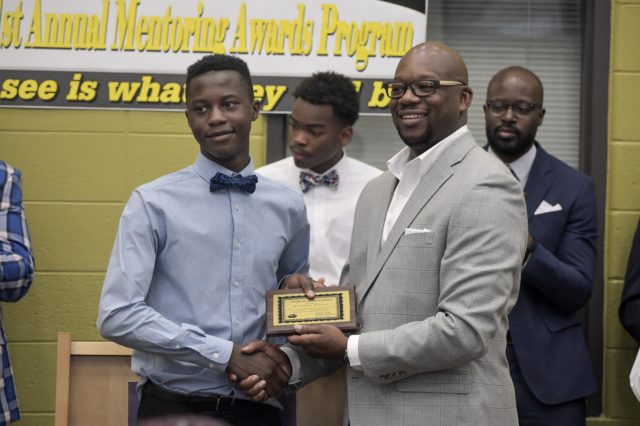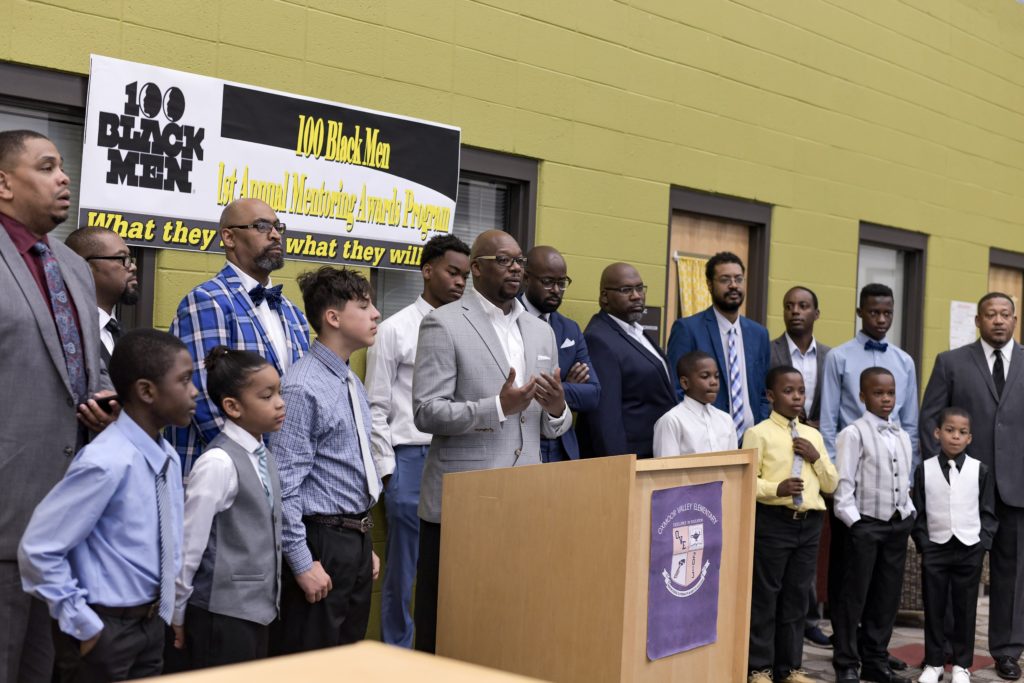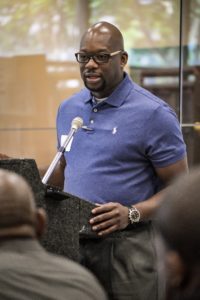
By Ameera Steward
The Birmingham Times

Being surrounded by influential men made Eddie Bradford want to be an influential man.
He learned from older men—a wise cousin; local attorneys and businessmen—and those interactions showed him what a mentoring program should look like, so he established his own. Bradford is not competing with other programs; he wants to complement them.
“My mentoring program is different from others,” said Bradford. “If you’re looking for a program that goes on field trips, provides bookbags or school supplies, offers perks like football and baseball games, … this might not be the program for you.
“My program is [designed] to build self-confidence and assurance, … to make you comfortable with who you are, to make you respectful to be able to go out to those other programs, be in those other settings … with confidence,” he said.
Bradford is the founder of Birmingham-based Bradford Mentoring and Consulting LLC, which focuses on assisting males and females from 8 to 27 years of age. The agency’s mission is to build bridges for a better future, which encompasses reaching out to at-risk youth by providing job readiness, preventing bullying, and dealing with peer-relationship, self-esteem, and anger-management issues.
No Limits
Bradford said he didn’t want a program with “limits.”
“At 21 [years of age], in most programs [young people have] ‘aged out,’ so I can’t assist them anymore,” he said. “Well, just because they’ve ‘aged out’, doesn’t mean they’ve ‘grown out.’ Then what you’re doing is [potentially] increasing the prison pipeline because this individual has nowhere else to go or no one else they’re going to listen to.”
Even though Bradford has counseled those in their late 20s, mentees “can give me a call at 30,” he said. “I’m not going to tell you, ‘You’re too old, man. I’m not going to talk to you anymore.’ I don’t do that.”
Bradford, who got the idea for his program in October 2013 and launched in February 2014, lives in the Graymont community and considers his home his home base. He doesn’t work from an office, but he does visit different schools and will mentor at the downtown Birmingham Public Library (BPL) Central Branch.
“I give my students 24/7 access. My phone is always available for them,” Bradford said. “Before you do something that’s going to cause a difference in your future, I want you to give me a call. Let’s talk about it. Let me talk you out of it, talk you through it, help you with it. That’s important.”
The Situation Bible

Bradford teaches his students or mentees through several different exercises, including a prayer book he calls “The Situation Bible,” which he will use with students, depending on the setting and with approval from parents. The book includes approximately 50 different challenges that youth may face, and each has a spiritual reference. Some of his exercises consist of worksheets based on common scenarios. For example, it may say “What does it mean to be a man? To me, being a man means …”; it also talks about courage and self-confidence, as well as being a leader, dependable, and self-reliant.
“Because … these are conversations [some] young men don’t have or a single parent, [perhaps] a mother, doesn’t think to ask or discuss because they don’t know how to explain or they understand, rightfully, ‘I’m a woman, … [and] I can’t tell you based off [my] experience,’” said Bradford, who works with a member of the Jefferson County Youth Detention Center that comes in and talks to the young men.
There’s also a counselor on Bradford’s team, “So, if there’s bullying that needs to be discussed or if there’s an evaluation that needs to be done based on the child’s psychological [needs], I bring those people or refer them over.”
Bradford also gets help from volunteers—a group of about six male and female mentors—that he’s called on as needed for the last three years.
Annually, his program works with approximately six to seven individual students at the BPL, and overall his team works with 200 to 300 additional students “because we [visit] several schools on a regular basis.” Last year, Bradford was in some schools three days a week, working with students at Center Point High School, Ernest F. Bush K-8 School, Bush Hills Academy, and Oxmoor Valley Elementary School.
Role Model
The 41-year-old Bradford was born and raised in Titusville and always knew he wanted to make a difference when he graduated from A.H. Parker High School. After graduating, he enrolled in Stillman College, where he majored in business management and elementary education and played basketball. During a practice, Bradford noticed the way his teammates responded to their coach, William “Cap” Brown.
“In the mid to late 1980s and early 1990s, … it wasn’t often that you found a male in an authoritative position in schools. We are always used to female teachers,” he said.
Bradford didn’t experience having a male teacher until he reached the seventh grade. Most males in schools, he recalled, worked in the lunchroom or as janitors and bus drivers. The experience with and respect for Brown convinced Bradford that he wanted to become a teacher and reach kids sooner. In addition, Bradford looked up to several older black males in Birmingham, including his cousin Robert Hanna; attorney Rodney Barganier; businessman Terry Smiley, and comedian Ced Delaney.
From Educator to Mentor
After graduating from college, Bradford would go on to become an educator, first as a substitute teacher. He relocated to northeast Georgia and started an after-school program at Suwanee Sports Academy, a privately-owned gym. He had high school upperclassmen tutor students in kindergarten through eighth grade; there also was a tutoring program for younger children. He started the program because there was no such facility in the area for children to attend.
“[Students in the program] had to do homework and then they would break down and go into different training skills [in] sports, such as volleyball, basketball, [and cheerleading]. High school athletes would teach and instruct during those activities,” said Bradford, who also leased a van for the kids who needed rides to the gym.
“I went around to the schools … and picked up the students,” he said.
When his father became ill, Bradford returned to Birmingham and commuted between the Magic City and Florida, where he worked as an insurance claims adjustor. Nonetheless, he would find his way back to his calling—mentoring young people.
Bradford, who also serves as mentoring chairman for 100 Black Men of Metro Birmingham, formed in 2018, said it’s a joy to see when students make positive changes.
“If that means you contemplated suicide but didn’t do it; if that means you committed a crime but after speaking to me or becoming involved with me you understand the consequences [of your actions]—if things are a little bit better now, if you turn your frown into a smile, I feel good about that,” he said.
Click one of the links below to read more stories about mentoring.
How Mentoring Programs Make Difference For Young Adults in Birmingham



